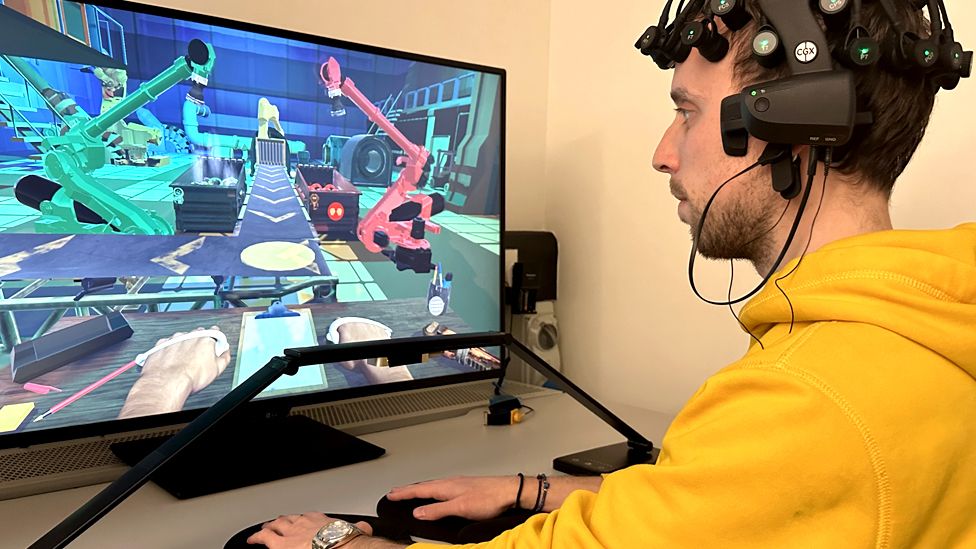ARTICLE AD BOX
 Image source, Cogitat
Image source, Cogitat
In this demo, the hand on screen is squeezing but the student's actual hand is not
By Zoe Kleinman
Technology editor
A system which can translate human brain activity into actions without any physical movement is being developed by a neurotech firm called Cogitat.
When wearing a prototype headset, basic actions in virtual reality can be carried out by thinking about them.
So for example, in a game where a VR jet ski is controlled by handles, you move by thinking about it, rather than squeezing your hands.
Elon Musk's firm Neuralink is developing a similar concept.
It is called brain-computer interface and there are many neurotech companies exploring it.
One aim is that it could eventually allow people who have suffered a stroke, or have other brain injuries, to control phones or computers remotely.
Neuralink's method requires a chip being placed into the brain itself. The firm has so far only worked with animals, and has been criticised for their treatment. It has released videos it says demonstrate a monkey playing the video game Pong with its mind, and the brain activity of a pig with a chip implanted in its brain.
Cogitat is one of the firms developing a system which works on top of the head rather than inside it.
It could one day take the form of a headband worn with a VR headset. Some companies are already creating their own hardware but, as a university spin-off, Cogitat is concentrating only on the tech behind it.
BBC tech editor Zoe Kleinman tries out a prototype
It is led by NHS consultant Allan Ponniah and computer scientist Dimitrios Adamos from Imperial College London.
The tech is in developmental stages, but has already been tried out on stroke patients, with positive results. The aim is to encourage them to continue with rehabilitation exercises by making them more engaging.
"When a person has had a stroke, and they can't move their arm, they're very demotivated to partake in rehabilitation. But our technology will allow them to imagine moving their hand and seeing a hand move on the screen, which we believe will motivate them to start their course of physiotherapy," Mr Ponniah told BBC podcast Tech Tent.
Weird experience
I tried it out and it is a very weird experience. For starters, it is harder than it sounds to think about making a movement without actually making it. And you also have to try not to think about other things, which increases your brain activity and creates more noise for the tech to decode while it looks for the motor signal.
I had never seen my own brain activity laid out on a screen in front of me in real time before, like a complicated, multi-layered cardiogram. That was strange in itself - seeing the essence of my thoughts on a graph. But when you hear that VR jet ski engine roar, just because you have thought about doing it, it is an incredible feeling.
Of course the prototype device was not totally reading my mind. It was not translating my thoughts or looking deep into my soul. It was only focused on motor skill signals.
"If you don't choose to interact with the system, nothing happens," says Mr Adamos. "There's nothing picked up from you if you stop using it."
Other firms focus on different types of brain activity - visual signals for example, so you can focus on a number and press buttons on a screen. It is also possible - but controversial - to concentrate on more personal responses such as likes and dislikes.
Cogitat says it expects to have a working prototype of its technology within the next 12 months - but there are several challenges which still lie ahead for neurotech.
Experts are still learning about brain activity. It is individual to each of us and it is not constant. It changes throughout the day and may be affected by factors like tiredness and dehydration as well as ageing. This means any brain activity reading systems require continual recalibration.
Cogitat is training its tech on a database of hundreds of volunteers who have been testing it out, which speeds up the calibration process. I met some of the team - mostly students, who were very enthusiastic, not to mention patient, as they guided me through the demonstration.
Mr Adamos tells me proudly that in a recent global machine-learning competition, Cogitat not only took first place but also beat a team from the US Army.
He offered everybody some time off to celebrate - but nobody took it.
"They were all in the next day," he says. "It's really fascinating for us, and everybody who's joined this journey."
You can follow Zoe Kleinman on Twitter @zsk.

 2 years ago
127
2 years ago
127








 English (US) ·
English (US) ·